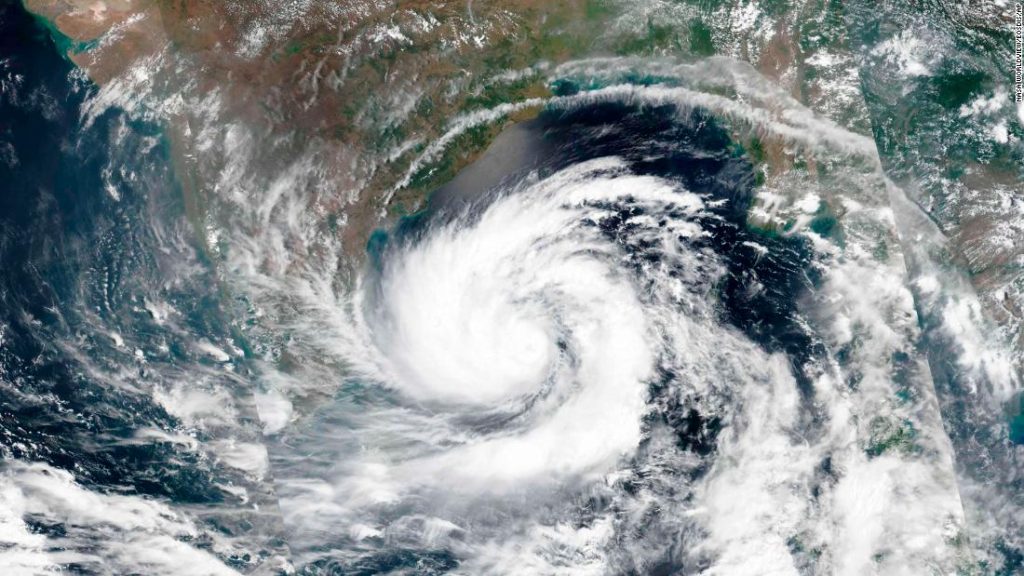The phrase Build Back Better is being used to describe the global policy response to the COVID19 pandemic that is intended to create more sustainable, resilient and inclusive societies. During the pandemic in May, the British news hardly noted the fact that Cyclone Amphan caused $13 billion in damages to infrastructure and crops in the eastern state of West Bengal, a state already seriously economically-affected by the COVID19 pandemic.
- Doughty Street Chambers is hosting a webinar with Lucrezia Busa, member of cabinet for the European Union, Commissioner of Justice, Didiers Reynders, and Dame Sara Thornton, UK Independent Anti-Slavery Commissioner – chaired by Krishnendu Mukherjee.
- It takes place on Monday 13 July 2020, 18.30 – 19.30.
- You can register here.
Cyclone Amphan has been attributed to the increasing occurrence of cyclones in the Bay of Bengal caused by anthropogenic climate change. Both crises have had a devastating effect on the Sundarbans, one of the largest mangrove forests in the world, and an important carbon sequestrator. The on-going effects of climate change in the Sundarbans, including floods and land-loss, had already led to affected people migrating to the cities, such as Kolkata and Dhaka to work in the most exploitative of industries, such as the garment industry, which has in turn been affected by the adverse actions of western buyers during the COVID19 pandemic, leading to migrants returning to their villages in the Sundarbans. This cycle of environmental problems, migration, poverty and re-migration is by no means limited to the Sundarbans (here) and is likely to become worse over time because of environmental pressures. One important constituent of our attempt to Build Back Better, is that there is a legislative response that assists us in doing that by identifying and remedying the cyclical factors which cause global human rights and environmental violations as the above examples illustrate.
On the 29th April 2020, the European Commissioner for Justice, Didier Reynders, announced that the Commission commits to introducing rules for mandatory corporate environmental and human right due diligence by 2021, as part of the European Green Deal. The announcement was made during an online event which was hosted by the EU Parliament’s Responsible Business Conduct Working Group in which Commissioner Reynders highlighted the findings of the Commission’s study on options for regulating due diligence requirements (here). The highlights of the study as outlined by the Business and Human Rights Resource Centre are that:
- The majority of stakeholders responded that the current regimes of voluntary measures have failed to significantly change the way businesses manage their social, environmental and governance impacts, and provide remedy to victims.
- Only 1/3 of business respondents stated that they currently undertake some form of due diligence which takes into account all human rights and environmental impacts. In their response, civil society is united in its call for mandatory and enforceable EU due diligence rules, while a majority of businesses are recognising the value of enforceable EU rules.
- A majority of stakeholders favour a cross-sectoral approach for an EU law, which will ensure effective harmonisation, legal certainty, a level playing field, and allow for a non-negotiable standard for business relationships throughout the supply chain.
The findings are significant for the existing and future laws on human rights due diligence, including the s.54 of the UK Modern Slavery Act 2015 and a number of laws that are being planned elsewhere, including Germany, Kenya, Norway, Switzerland and Thailand. In particular, in relation to s.54 of the UK Modern Slavery Act 2015, the amendment to a mandatory provision was also a recommendation of the Independent Review of the Modern Slavery Act 2015.
In terms of the EU law, the DG Justice will launch a public consultation on the initiative in the coming weeks, with the idea that it should be tabled in the first quarter 2021. The law would incorporate the concepts of the UN Guiding Principles on Business and Human Rights to identify, prevent, mitigate and account for human rights abuses and environmental damage linked to corporate operations, subsidiaries or value chains. Mr Reynders gave assurances that the new law, modelled on the French ‘duty of vigilance’ law which requires companies to show a ‘duty of care’ in their operations, investments and supply chains, will offer access to remedy for victims and strong enforcement mechanisms. The German Government, which will take over the next six -months EU Presidency from July, indicated that it supported the initiative.
The Responsible Business Conduct Working Group also supports the initiative and has put forward a number of key principles are included when drafting the legislative proposal (here):
- Applies to undertakings (i.e. business enterprises, including financial institutions) of all sizes and across all sectors, which are domiciled or based in, operating, or offering a product or service, within the EU; taking a risk based approach that would allow SMEs that are not engaged in risky activities to take a simplified approach; allows application that is reasonable and commensurate to the capacity, resources and leverage of a given business, particularly in the case for SMEs.
- Includes the obligation to respect human rights and the environment in their own domestic and international activities, and to ensure such respect throughout their global value chains, products, services and business relationships;
- Ensures that business enterprises have an obligation to identify, prevent, mitigate, monitor and account for potential and actual human rights abuses and environmental harm in their entire global value chains through ongoing due diligence processes, and to publicly report on such processes, their effectiveness and results; taking into account the different impacts of business operations on particular right holders and vulnerabilities, such as women, children, migrants, indigenous people, etc.”;
- Is supplemented by more specific standards and guidance that provide clarity and certainty to business and stakeholders about the processes and topics expected to be covered.
- Establishes civil liability for human rights abuses and environmental harm to ensure compliance with these obligations and provide much needed access to remedy for victims by removing any barriers to justice (e.g., burden of the proof, time limitations), and by ensuring that this legislation will be mandatory.
- Provides authorities with effective instruments, standards and guidelines to monitor compliance and ensure enforcement, including through penalties and sanctions.
The EU initiative is an important step in ensuring that we Build Back Better after the COVID19 pandemic, and the input of all stakeholders during the consultation, will be essential for an effective legislative foundation. However, the detail of the standards and guidance to be applied to human rights due diligence reporting and remedy will be crucial as companies incrementally improve the human rights and environmental situation in their business activity going forward to build a more sustainable, resilient and inclusive future.








